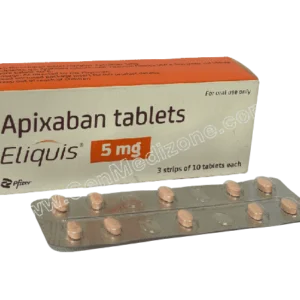Eliquis (apixaban) is a highly regarded anticoagulant prescribed for the prevention of blood clots and the reduction of stroke risk in patients with certain medical conditions. It belongs to a class of medications known as direct oral anticoagulants (DOACs), which work by inhibiting factor Xa, a crucial enzyme in the clotting process. This article delves into the intricacies of Eliquis, including its usage, side effects, alternatives, and essential precautions.
What is Eliquis?
Eliquis is a prescription medication that is primarily used to prevent blood clots in patients with atrial fibrillation (AFib) that is not caused by a heart valve issue. It is also commonly prescribed to treat deep vein thrombosis (DVT) and pulmonary embolism (PE), and to reduce the risk of these conditions recurring. Eliquis is favored due to its efficacy and lower risk of major bleeding compared to traditional anticoagulants like warfarin.
How Eliquis Works
Eliquis works by directly inhibiting factor Xa, an enzyme necessary for the conversion of prothrombin to thrombin, a key step in the formation of blood clots. By blocking this process, Eliquis effectively reduces the likelihood of clot formation. This mechanism makes it particularly useful in managing conditions where the risk of stroke or systemic embolism is heightened.
Dosage and Administration
Standard Dosage
The typical dosage of Eliquis for patients with non-valvular atrial fibrillation is 5 mg taken orally twice daily. However, a reduced dose of 2.5 mg twice daily may be recommended for patients with certain risk factors, such as advanced age, low body weight, or compromised renal function.
Treatment of DVT and PE
For the treatment of DVT and PE, the recommended starting dose is 10 mg taken orally twice daily for the first seven days, followed by 5 mg twice daily thereafter. For extended prevention of recurrent DVT and PE, a dose of 2.5 mg twice daily may be prescribed.
Who Should Not Take Eliquis?
While Eliquis is widely prescribed, it is not suitable for everyone. Patients with certain conditions should avoid this medication. These include individuals with active bleeding, severe liver impairment, or those who have undergone surgery that requires immediate anticoagulation reversal. Additionally, patients with known hypersensitivity to apixaban or any of the excipients in Eliquis should not use this drug.
Potential Side Effects of Eliquis
Common Side Effects
Like all medications, Eliquis can cause side effects. The most common side effects include minor bleeding such as bruising, nosebleeds, and gum bleeding. Some patients may also experience nausea or anemia.
Serious Side Effects
Serious side effects are less common but require immediate medical attention. These include major bleeding events such as gastrointestinal bleeding, intracranial hemorrhage, and hemorrhagic stroke. Patients should be vigilant for signs of serious bleeding, such as unusual bruising, dark urine, tarry stools, or coughing up blood.
Allergic Reactions
Though rare, allergic reactions to Eliquis can occur. Symptoms may include rash, itching, swelling (especially of the face, tongue, or throat), severe dizziness, or trouble breathing. If any of these symptoms occur, immediate medical intervention is necessary.
Drug Interactions
Eliquis has the potential to interact with a variety of medications, which can either increase the risk of bleeding or reduce the effectiveness of the drug. It is crucial for patients to inform their healthcare provider of all medications they are currently taking.
Medications That Increase Bleeding Risk
Drugs that can enhance the risk of bleeding when taken with Eliquis include other anticoagulants, antiplatelet drugs, nonsteroidal anti-inflammatory drugs (NSAIDs), and selective serotonin reuptake inhibitors (SSRIs).
Medications That Affect Eliquis Levels
Certain medications can alter the blood levels of Eliquis, leading to either increased bleeding risk or reduced anticoagulant effect. For example, strong inhibitors of both CYP3A4 and P-glycoprotein, such as ketoconazole and ritonavir, can increase Eliquis levels. Conversely, strong inducers of these enzymes, such as rifampin and phenytoin, can decrease its effectiveness.
Precautions and Monitoring
Kidney Function Monitoring
Patients with renal impairment need careful monitoring while on Eliquis. Dosage adjustments may be necessary depending on the severity of kidney function decline. Regular kidney function tests are recommended to ensure the safe use of this medication.
Surgical Considerations
Before undergoing surgery, patients should inform their healthcare provider about their Eliquis use. Depending on the type of surgery and the patient’s bleeding risk, Eliquis may need to be temporarily discontinued. A plan for bridging anticoagulation, if necessary, should be established to manage the perioperative period safely.
Pregnancy and Breastfeeding
Iverheal 12 Mg should be used during pregnancy only if the potential benefit justifies the potential risk to the fetus. The effects of Eliquis on breastfeeding infants are not well studied, so breastfeeding mothers should discuss potential risks with their healthcare provider.
Alternatives to Eliquis
While Eliquis is a popular choice for anticoagulation, other options are available for patients who may not tolerate this medication or for whom it is contraindicated.
Warfarin
Warfarin is a well-known anticoagulant that has been used for decades. Unlike Eliquis, which has a fixed dosing regimen, warfarin requires regular blood tests to monitor the International Normalized Ratio (INR) and adjust the dose accordingly. Despite its need for monitoring, warfarin remains a viable alternative, particularly in patients with mechanical heart valves or those with severe renal impairment.
Other DOACs
Other direct oral anticoagulants, such as rivaroxaban (Xarelto) and dabigatran (Pradaxa), provide alternatives to Eliquis. Each of these medications has its own dosing regimen, advantages, and potential side effects, making it essential to tailor the choice to the individual patient’s needs and risk factors.
Heparin and Low Molecular Weight Heparins
In some cases, especially in acute hospital settings, heparin or low molecular weight heparins (LMWHs) like enoxaparin may be used as alternatives to Eliquis. These medications are often used for short-term anticoagulation, particularly in patients undergoing surgery or those with certain types of blood clotting disorders.
Patient Education and Compliance
Importance of Adherence
Adherence to the prescribed Eliquis regimen is crucial for preventing blood clots and reducing the risk of stroke or other serious complications. Patients should be educated on the importance of taking Eliquis exactly as prescribed, without missing doses.
Managing Missed Doses
If a dose is missed, it should be taken as soon as the patient remembers. However, if it is close to the time for the next dose, the missed dose should be skipped, and the next dose should be taken at the regular time. Doubling up on doses to make up for a missed one is not recommended.
Conclusion
Eliquis plays a vital role in the prevention and treatment of thromboembolic events in patients with atrial fibrillation, DVT, and PE. While it is an effective anticoagulant, patients and healthcare providers must be aware of its potential side effects, drug interactions, and the importance of proper dosing and monitoring. By understanding these factors, patients can use Eliquis safely and effectively to manage their conditions.


